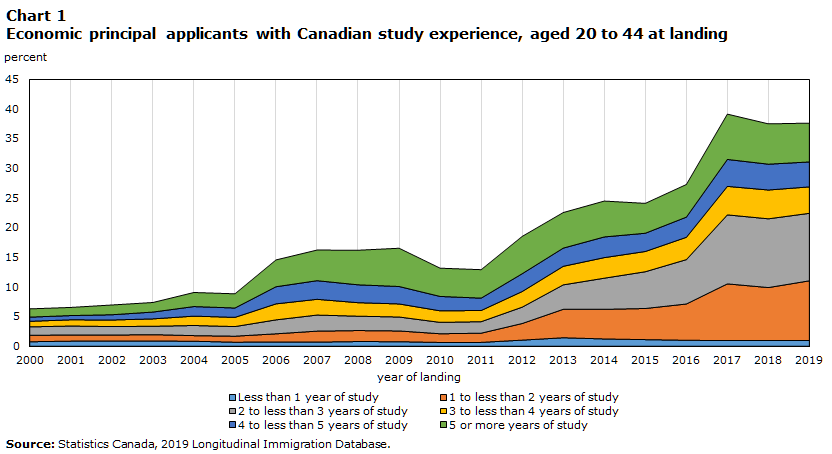Have you just arrived in Canada as an immigrant or a student? Are you wondering what to do now? Well, you’re not alone! If you are new to Canada and want to pursue a new career, then consider studying further to brighten your chances of landing a job that pays you more.
The latest report by Statistics Canada states that the immigrants who studied from Canadian institutions are paid better in the first two years after having immigrated to Canada than the newcomers who arrived in Canada with education from other countries. This can be due to the graduates from Canada having a better language proficiency and Canadian work experience prior to them applying for permanent residency.
International students have been opting to study at Canadian universities and Canada has become a top choice for international students globally. This can be attributed to economical study costs and liberal immigration policies.

In an article published in Canadian Immigrant magazine, Denise Amyot, President and CEO of Colleges and Institutes Canada, and Don Bureaux, President of the Nova Scotia Community College, wrote, “Making it easier for the tens of thousands of international students who are already in the country to access permanent residency, is key to reaching Canada’s immigration target. These students are ideal candidates for immigration – with an education grounded in Canada, an understanding of Canadian workplace norms, and, in many cases, a strong desire to make Canada their permanent home.”
Share of Immigrants With Canadian Study Experience is Rising
The report also suggests that the share of economic immigrants with pre-immigration Canadian education has been increasing over the years. The chart below shows the share of immigrants having Canadian study experience among economic principal applicant immigrants over the 2000-to-2019 period.
In this context, Canadian study experience means individuals who held a study permit, and the years of Canadian study experience are calculated from the total duration of valid study permits that the individual ever held before becoming a permanent resident.
The trend has been that since the beginning of the year 2000, the number of economic immigrants to have Canadian study experience before getting their permanent residence has been on the rise (Chart 1). In 2000, out of the newly admitted economic principal applicants, about 6% held study permits earlier. This share grew to 39% in 2017 and was 38% in 2019. The number has been hovering around this average as more international students are transitioning to permanent residency with Canadian study experience. The sharp rise between 2016 and 2017 happened due to the fact that the international students got additional points for Canadian education in the 2016 modification of the Comprehensive Ranking System.

If you want to secure a job that pays you well, consider enrolling yourself in an industry-relevant course at a Canadian institute. Here are three reasons why you should opt for Canadian education:
1. Canadian education/work experience is valued
If you start over in Canada with just a study permit, you are entitled to work for up to 20 hours off-campus as an international student. But if you are a mature student and an immigrant, you can continue your educational journey with post-secondary courses. You get to work as much as you’d like along with pursuing the course. Having work experience and a Canadian degree/diploma enhances your skills. This is going to pay off in the long run.
2. Efficient Language Skills Improve Employability
The Statistics Canada report cites language fluency as one of the major factors that helps enhance chances of employability and income among Canadian-educated immigrants. According to a news release by the Canadian government, international students possess “strong employment and language skills, bolstered by their Canadian education and work experience, so they are typically well positioned to apply for permanent resident status”. Being a student, you can hone your language skills and improve communication in English. Canada is well-known for its linguistic plurality as it is home to large immigrant populations. You can also learn a new language to make it easier for you to work in a multicultural environment.
3. Familiarity With Locals And Their Culture Is a Bonus
Canada supports multiculturalism. Learning institutes welcome students from diverse backgrounds, which gives you a chance to learn about the local culture and get to know more about Canadian society. It helps you build greater cultural awareness and sensitivity as you go along cultivating people skills during the course.
Employers prefer people who are flexible to work in a multicultural setting. A survey depicts the positive connection between diversity at the office and productivity. A diversity increase of one per cent leads to an average increase of 2.4% in revenue and 0.5% in productivity, while a few industries can achieve about a six per cent increase in revenue corresponding to diversity.
The Statistics Canada data reveals that in 2019, over 58,000 graduates were successful in getting permanent residency. The majority of these individuals are younger, better fluent in languages, and educated from Canada.
Still looking for a reason to study in Canada?
ABM College can help you fulfill your dream of getting a rewarding career with its innovative technology, healthcare, and business programs. Studying at ABM College equips you with job-ready skills.
Call us now!
*Source: studyinternational.com
About The Author

Private Career College
ABM College is a leader in career-focused education, committed to empowering students with industry-relevant skills. With expert instructors and practical training, ABM College delivers high-quality programs in health, business, technology, and more, ensuring graduates are prepared to meet workforce demands. Known for its supportive learning environment and a focus on real-world application, ABM College is a trusted educational partner helping students achieve professional success across Canada.
